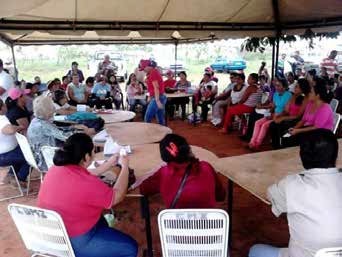Creation of an Agrarian Assembly in the Ezequiel Zamora municipality of Monagas state
Abstract
The Agrarian Assembly is a space for territorial planning with the participation of all the forces of popular power (communal councils, peasant councils, communes, collectives, indigenous communities, peasant fronts and other actors) as referred to in article 43 of the Security and Sovereignty Law. Alimentaria (LOSSA, 2008) and the institutional "superstructure", to agree on agrosocioproductive plans based on socialist values and principles of social justice and participatory and protagonist democracy, leaving behind anarchy and the anti-values of capitalism marked by selfishness, individualism and whose sole purpose is to make a profit.
The scope and perspectives of the Agrarian Assembly are expressed in the feelings of each social actor involved, since they play a leading role in the directionality of the planning of agricultural productive development and the promotion of food sovereignty. The Agrarian Assembly allows all those who interact there to experience a frank process of human development that goes from the individual to the collective and the technical-productive. Planning, identification of gaps and potential, exchanges of knowledge, experiences are shaping the collective construction of knowledge and the future.
By virtue of the achievements made in his first year of administration (2013-2014), exceeding 55 assembly sessions, this process was established as an experience of creating a legitimate Agrarian Assembly. It thus results in a methodological proposal that tries to be a reference for other initiatives and organizational environments where the necessary link between State institutions and popular power is to be developed. Reaching independence based on food sovereignty, new forms of social organization and an eco-socialist productive model are national objectives of the Plan de la Patria (2013-2019) that inspire the exercise of this Agrarian Assembly.
The participating institutions develop together with these actors, a frank process of agricultural research, innovation, development and training, under the focus of participatory action research.
References
Balza, A. 2012. De la disciplinariedad a la transdisciplinariedad del conocimiento. Un desafío para abordar los estudios de postgrado en Venezuela. Investigación interdisciplinaria: aporte a la sociedad de los saberes. Mirian Carmona (compiladora). Ed. ONCTI, 1ª edición, Caracas, Venezuela.
Fals Borda, O. 1986. El problema de cómo investigar la realidad para transformarla – por la praxis-. Colombia. Ediciones Tercer Mundo. 4a. Edición.
Ley del Plan de la Patria 2013. República Bolivariana de Venezuela.
Ley Orgánica de Seguridad y Soberanía Alimentaria
2008. República Bolivariana de Venezuela.


